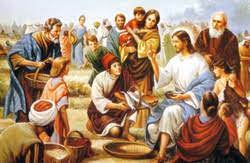Gospel – John 6:1-15
After this Jesus went to the other side of the Sea of Galilee, also called the Sea of Tiberias. A large crowd kept following him, because they saw the signs that he was doing for the sick. Jesus went up the mountain and sat down there with his disciples.
Now the Passover, the festival of the Jews, was near. When he looked up and saw a large crowd coming towards him, Jesus said to Philip, ‘Where are we to buy bread for these people to eat?’ He said this to test him, for he himself knew what he was going to do. Philip answered him, ‘Six months’ wages would not buy enough bread for each of them to get a little.’
One of his disciples, Andrew, Simon Peter’s brother, said to him, ‘There is a boy here who has five barley loaves and two fish. But what are they among so many people?’ Jesus said, ‘Make the people sit down.’ Now there was a great deal of grass in the place; so they sat down, about five thousand in all. Then Jesus took the loaves, and when he had given thanks, he distributed them to those who were seated; so also the fish, as much as they wanted.
When they were satisfied, he told his disciples, ‘Gather up the fragments left over, so that nothing may be lost.’ So they gathered them up, and from the fragments of the five barley loaves, left by those who had eaten, they filled twelve baskets. When the people saw the sign that he had done, they began to say, ‘This is indeed the prophet who is to come into the world.’
When Jesus realized that they were about to come and take him by force to make him king, he withdrew again to the mountain by himself.
The Gospel of the Lord
The Mass Intention is for Holy Cross, Saint Margaret Clitherow and Our Lady’s Academies
Reflection:
This is the only miracle found in all four gospels, which means it is an exceptional event with meaning that goes much deeper than the extraordinary feeding of those thousands.
In today’s gospel of John, Jesus is the one who explains in great detail what this sign means. The evangelist links the miracle with the mission of Jesus and the Eucharist: he uses the same verbs we later find in the institution of the Eucharist – Jesus took the bread, gave thanks and gave the bread to the people inviting them to take as much as they needed.
Jesus once said that he came so that we may have life and life in abundance, and this is so evident in this miracle: Everybody ate as much as they wanted, and there were twelve baskets of leftovers, much more than the amount they started with.
This reminds me of the extravagant quantity of water turned into wine at Cana: I consider how God in Jesus is generous beyond my imagination, in Cana, in the multiplication of the loaves, in my own life. I ask for the grace of gratitude.
- What miracles has God worked for you and how do you acknowledge his blessings?

